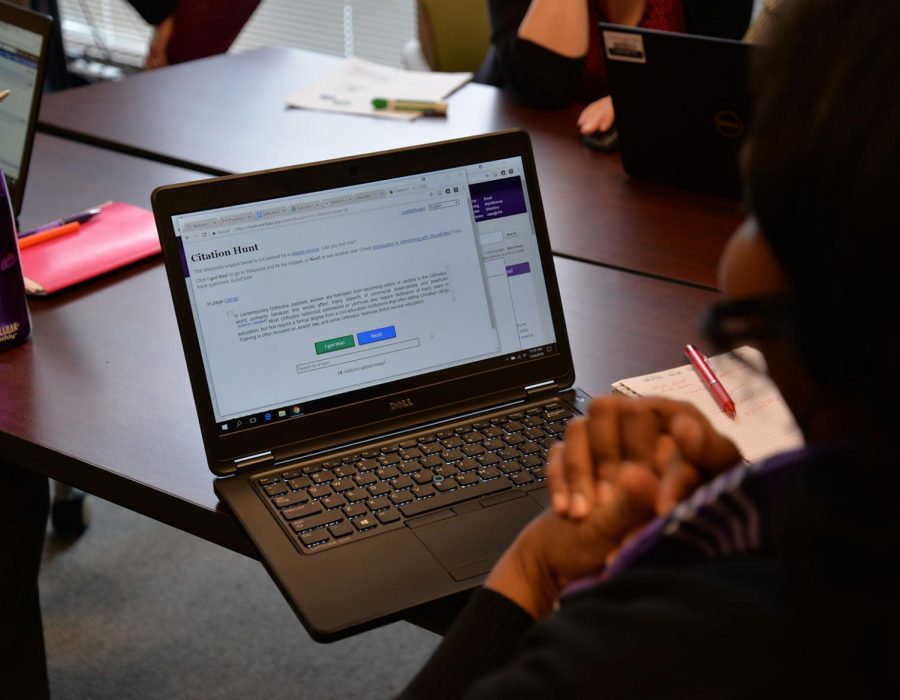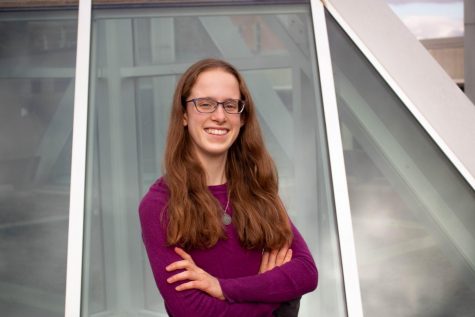Edit-a-thon focused on women and LGBTQ+ representation
Rod Library to host UNI Edits Wikipedia: Women and LGBTQ+, an all day edit-a-thon, on Friday, March 8, from 10 a.m. to 4 p.m.
Mar 7, 2019
Wikipedia is a go-to for many students seeking a source for quick information.
According to Angela Pratesi, librarian of Fine and Performing Arts at Rod Library, it is the fifth most-used website in the world, and the seventh most used in the United States. Many scholars feel, however, that in terms of diversity, especially articles about women’s and gender-related issues, Wikipedia is lacking.
“Wikipedia is supposed to be the largest compendium of human knowledge ever created,” said Pratesi. “But there are known content gaps because of who is opting to edit.”
That’s why the Rod Library will be hosting UNI Edits Wikipedia: Women and LGBTQ+, an all-day edit-a-thon that will take place in Rod Library 287 from 10 a.m. to 4 p.m. on Friday, March 8.
Theit goal in hosting the event is to get more people involved in editing Wikipedia, and to provide them with the resources and skills to get started.
Pratesi, who is serving as the organizer for the event, explained that the overwhelming majority of Wikipedians (experienced editors of the site) are highly-educated white males from Christian counties in the northern hemisphere.
“Their knowledge is extremely valuable, but it doesn’t reflect all human knowledge, because their experiences do not reflect the whole diversity of human experience,” she said. “Really, this represents a form of systemic bias that’s built directly into Wikipedia.”
Friday’s event at Rod Library is part of a larger series of edit-a-thons that Rod has hosted throughout the 2018-2019 academic year.
In September 2018, in a partnership with the Frederick Douglass Human Rights Festival, the library hosted an edit-a-thon centered around issues of human rights and social activism.
An edit-a-thon focusing on people of color took place during December 2018.
This March event is focused on women’s and LGBTQ+ representation, and the series will conclude with a final edit-a-thon on April 19, also from 10 a.m.- 4 p.m., open to any diversity topic whatsoever.
According to a 2018 article from The Guardian, the first Wikipedia edit-a-thons were
informal gatherings that began in 2011. The idea gained ground, however, with the 2014 establishment of Art + Feminism, “a do-it-yourself campaign to improve coverage of gender, feminism, and the arts on Wikipedia,” according to the group’s website. Art + Feminism hosted their six annual edit-a-thon at the Museum of Modern Art in New York City on March 2, 2019.
They are also responsible for providing resources and materials for other edit-a-thons worldwide.
The event at Rod Library is just one of hundreds of edit-a-thons that will take place at institutions worldwide throughout the month of March.
For students who may feel their technological skills aren’t up to par, Pratesi emphasized that there is truly no experience required to participate.
“If you can tweet, you can edit Wikipedia,” she said.
At the event, editors will use personal accounts, meaning that each attendee will need to have their own login information. Participants can create an account on-site at the event, but Pratesi advises students to do so beforehand, since Wikipedia restricts the number of new accounts that can be created from the same IP address within a 24-hour window.
To create an account, students should visit any Wikipedia page and click “log in” in the top right-hand corner. No email address is required, only a username and password, but Pratesi does recommend that students not use their real names when creating an account.
“A little bit of anonymity can be a good thing on the Internet,” she said, “especially when we know that people who present as female can be subject to more harassment than others.”
According to Pratesi, it is these issues of underlying bias that edit-a-thons hope to correct, by shifting the imbalance of Wikipedia content to include more articles about diverse topics.
Attendees can bring their own ideas for content they are interested in editing, and for those who don’t have specific ideas, Pratesi and her colleagues will provide a list of potential topics that need articles or whose articles need updates. Even if students don’t have previous knowledge of the subjects they’re editing about, Pratesi said that resource materials will be provided, and reference librarians will be on hand to help new Wikipedians.
“You can dig in and dive further into something that catches your imagination,” she said. “We’ll be there to provide training and support for anything you might need.”
Pratesi sees these edit-a-thons as a way to not only benefit the diversity of Wikpiedia as a whole, but also to increase knowledge of research skills and digital literacy among participants.
“It’s a really excellent tool not only for information, but also to teach people about information,” she said. “We can learn about researching and being more information literate in a world where we are bombarded by information that is very confusing and often incorrect.”
Since the Rod Library event is an all-day affair, breakfast, lunch and afternoon snacks will be provided. Childcare is available with advance reservations, and although childcare registration has already closed for tomorrow’s edit-a-thon, those who need childcare for the April 19 event can simply email Pratesi at [email protected].
“We don’t want parenthood to be a deterrent to participating,” she said.
Whether attendees are parents, students, or community members, Pratesi said the goal is to make sure all voices are heard.
“Everyone has an opportunity to make the Internet better, and to make quality information available to everyone from around the world,” she said. “Everyone can learn a new skill or practice skills that they already have, and share their knowledge and emerging authority.”















